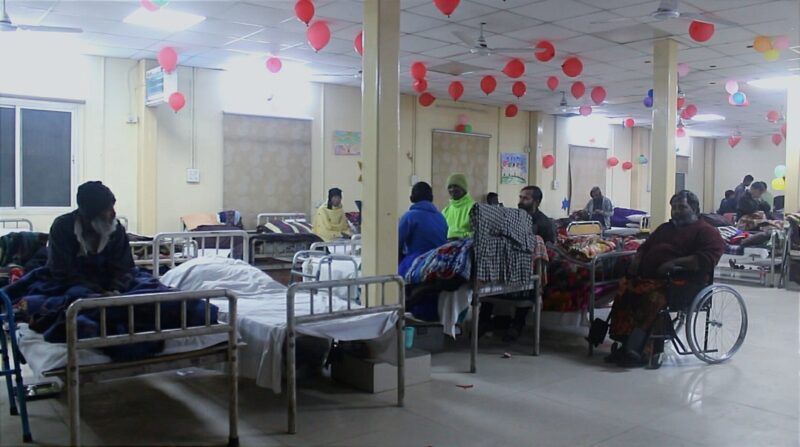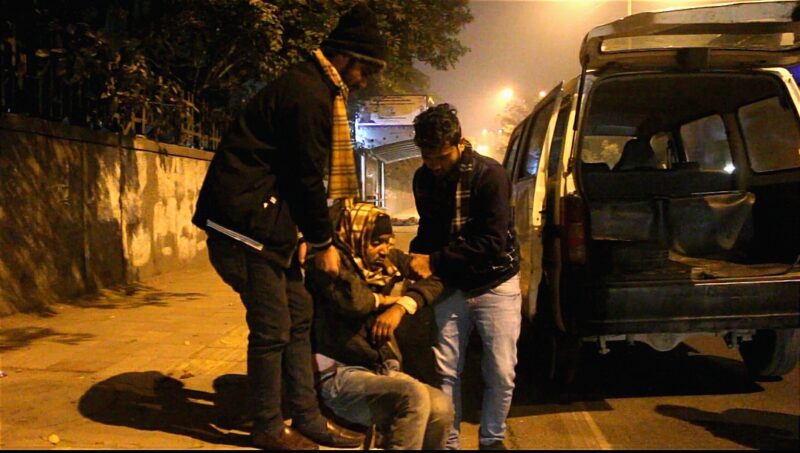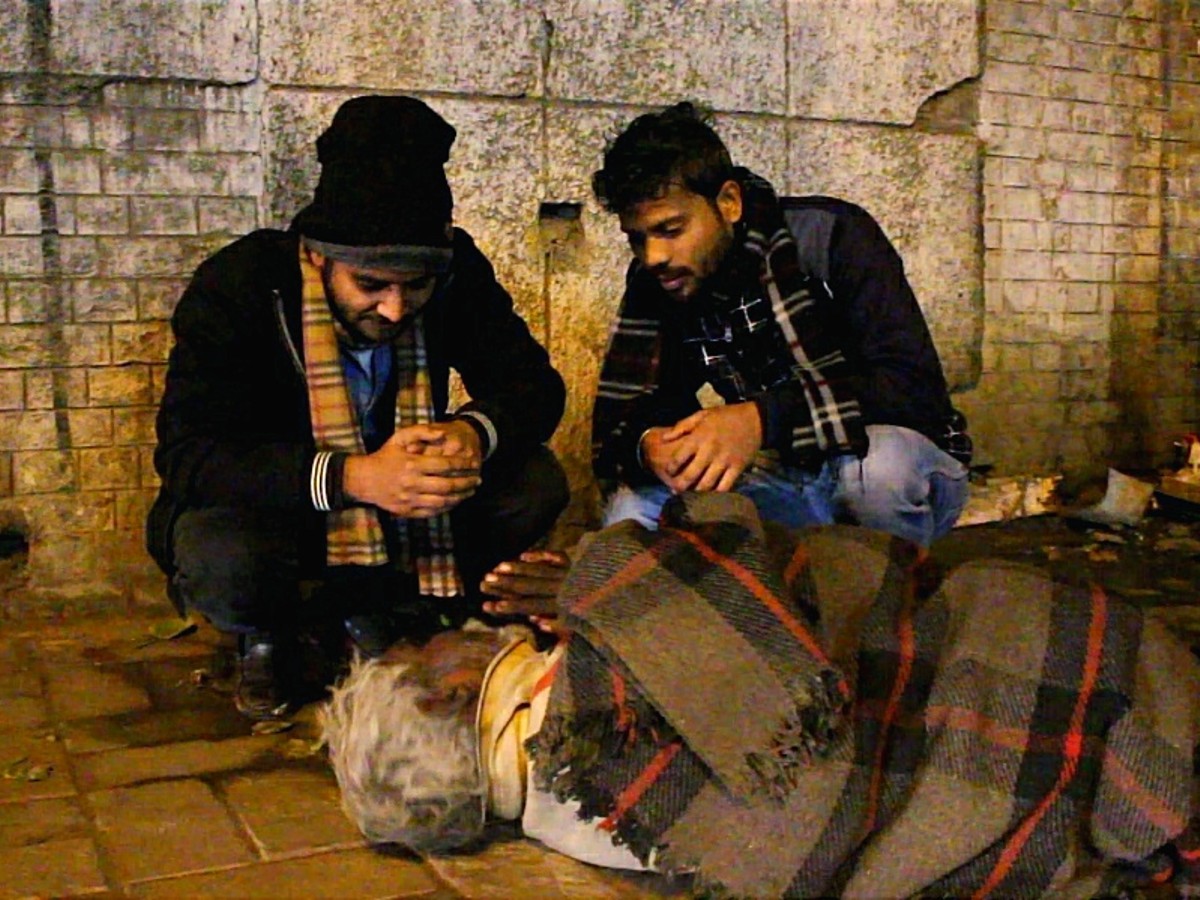At 9.30 pm, a rescue van belonging to the Society for Promotion of Youth and Masses (SPYM), starts its tour of the city from the Sarai Kale Khan night shelter as the staff inside the van keeps an eye outside the window to spot anyone exposed to the cold weather on the streets of Delhi.
They find a man lying on the streets under the bare sky without a blanket in the Nizamuddin area. The van stops and takes him to a nearby shelter where the volunteers provide him with a blanket and a bed for the night. They then register his name.
“Every night in winters, we go out to rescue the homeless people and take them to shelter homes. Most of them are migrant workers, day labourers and street vendors, who end up sleeping on the road at night. We go around every night and take them to nearby shelter homes,” says Dheeraj, a 28-year-old working with SPYM.
Umesh, the 37-year-old driver of the rescue van, says that the task isn’t easy and sometimes fraught with the risk of a brawl.
“Sometimes, we risk our lives to rescue them because they are mostly drunk and it is hard for us to convince them. I have been driving this car for 15 years. It starts at 9:30 at night and continues till 4 am,” explains Umesh.

Death of homeless people has been quite common in the Capital, especially during winters. The poor and destitute often struggle to find sufficient clothing or shelter to protect themselves from the harsh weather.
But thanks to the contribution of individuals, NGOs and organisations like SPYM, things have improved and a number of lives have been saved.
Lives saved
“Our team goes through the streets of Delhi at night time during winters to rescue homeless people and protect them from biting cold. Over the years, many people have lost their lives due to cold. However, now SPYM, under the Delhi Urban Shelter Improvement Board (DUSIB) has started this initiative. We are able to save many lives during winters with this,” says Vikki Kannaujiya, a 29-year-old, who has been working as a caretaker at the night shelter in Sarai Kale Khan for the last six years.
Explaining the entire process, Kannaujiya says, “At first, our team goes out to rescue people who are living on the streets. Then we take them to nearby shelters. If anyone has a complication like an illness, we take him to the hospital for medical check-up. We then bring him here to the recovery shelter. Here in Sarai Kale Khan, we have the only recovery shelter in Delhi. We provide the affected with meals, blankets, medicines and take care of their health.”
Most people who come here have injuries while some are drug addicts. After they recover at the shelter, they are shifted to either the general shelter for males, which is upstairs or to other night shelters as per convenience.
Laxman, a 42-year-old, who hails from Jaipur in Rajasthan has been living in Delhi since the 90s. He was working as tour operator in Paharganj, where he got addicted to drugs.
“I took drugs for 35 years. My health worsened during the lockdown. One of my friends told me about the SPYM rehabilitation centre in Dakshinpuri where I got admitted. They then referred me to the recovery shelter. Since then, I have been living here. They also take me to hospital for regular check-ups, provide me with medicine and all kinds of facilities,” says Laxman.
Kannaujiya says that the people are kept in the recovery shelter so long as they suffer.
“Till the time these people are not well, we keep them here,” he adds.
Suraj, 26, another worker who accompanies the rescue van, says the job of rescuing often gets challenging and not just because of brawls or obstinacy.
“We get complaints from different areas, and when we reach there, the one who has complained wouldn’t take our calls nor share the exact location.”
In one case, SPYM workers got a call from Badarpur in Delhi through DUSIB but when the team reached there, no one showed up.
Refusal to go
The van goes around in the area but cannot spot anyone. After a while, the staff sees a middle-aged man lying under a blanket at a bus stand in Badarpur border.
The SPYM workers try to reach out to him but he refuses to go along with them.
“These things happen often because many of them don’t want to lose the place they are used to. They think that if they leave, someone else will occupy the place. We try hard to convince them, but if a person doesn’t want to come along, we can’t force them,” adds Dheeraj.

a nearby shelter in midnight
Suraj points at another reason for them not going to shelter homes.
“In many cases, they don’t want to go to shelter homes because they feel they’ll lose their earnings. They often sell blankets donated to them in the morning.”
It is past 2 am. As the van moves through the thick night, a bunch of people are seen providing blankets to homeless people in Sarita Vihar. Some distance ahead, the staff spots a woman sleeping on the footpath. They reach out to her but, she refuses to go along.
Willing to go
In the neighbouring Sukhdev Vihar, the driver spots a man, exposed to cold breeze, by the roadside. SPYM workers rush to him and take him to a nearby shelter where he breathes a sigh of relief.
Shyam, a 32-year-old, who migrated from Uttarakhand to Delhi six years ago, encountered a life-changing accident. But help from SPYM helped him.
“I met with an accident two years ago. I was brought here from the hospital. All these people are taking good care of me. I don’t have anyone living here. These people brought me here and got me treated. I have been undergoing treatment for the last two years,” she says further.





